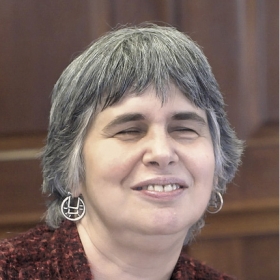1946–2013
Adrienne Asch, who died on Nov. 19, 2013, taught at Wellesley for just a little more than a decade, from 1994 to 2005, but in that time, she made a profound impression on the students and faculty members who came to know her.

Adrienne Asch, who died on Nov. 19, 2013, taught at Wellesley for just a little more than a decade, from 1994 to 2005, but in that time, she made a profound impression on the students and faculty members who came to know her. Adrienne was an influential voice for people with disabilities in debates over matters such as end-of-life care, genetic counseling, and abortion—debates in which their perspectives and experiences had been discounted. Through her books, articles, and many public appearances in the US and around the world, as well as her participation on a multitude of commissions, task forces, and advisory committees, Adrienne helped to transform scholarly debates on those topics and inspire changes in professional practices and legislation. Adrienne’s work was charged by her passion for social justice and a vision of a world fairer to all people, including those with disabilities. At Wellesley, she brought that same passion to her teaching, and so became a powerful figure in the lives of her students.
Before her career as a scholar, Adrienne had been a psychotherapist, a political activist, and an investigator for an antidiscrimination agency. Her turn to academia began in the early 1980s when the “Baby Doe” cases came to national attention. The Baby Does were disabled newborns whose parents had withheld relatively simple life-saving treatments. Attending a forum on the controversy, Adrienne pointed out that the debate pivoted on assertions about the lives of people with disabilities, but that the group who knew the most about this, disabled people themselves, seemed to be excluded from the discussion. That was a pattern she found throughout bioethics: Arguments over whether it was ethical to abort fetuses with genetic defects, she discovered, were dominated by tragic myths about the lives of people with disabilities, rather than actual lived experience. She urged reforms in genetic counseling that would replace such assumptions with real-world information.
Adrienne’s writings combined insights from feminist theory, philosophy, psychology, and the new field of disability studies, in which she was pioneer. Perhaps understandably, the College didn’t seem to know what to make of her. Instead of being placed in a department, Adrienne was given her own program: She was the only faculty member in “Biology, Ethics, and the Politics of Human Reproduction.” Adrienne bragged that she had both the longest title and the shortest department meetings of anyone at the College. (Eventually, the College asked her to join the Women’s and Gender Studies Department, where she taught for two years.)
Students flocked to her courses: Ethical and Policy Issues in Reproduction; Women and Motherhood; Multidisciplinary Approaches to Abortion; Literature and Medicine; Disability and Society. They found a scholar with, as an article about her in the journal Nature put it, the “endearing ability to be at once gracious and confrontational, passionate and prickly.” The intensity that marked Adrienne’s life as a public intellectual made her a fascinating teacher and a loyal ally to students. One of her Wellesley students, Bergen Nelson ’98, now a doctor, writes that Adrienne was not simply an “amazing teacher and mentor,” but also a “dear friend” who continued to guide her personally and professionally for many years after Wellesley. Adrienne inspired some students to pursue careers in bioethics, but perhaps even more importantly, influenced many more students who graduated into health careers to keep in mind the ethical issues and perspectives they learned from her.
Bostonians are wearily familiar with Red Sox stars who leave town to play for the Yankees. Like those baseball phenoms, when Adrienne got a better offer, she too left Boston for New York: She moved to Yeshiva University to become the first director of its Center for Ethics. Befitting her multidisciplinary background, at Yeshiva she was a professor of bioethics who held a joint appointment in Yeshiva’s medical school, but also taught in its law and social-work schools.
I’ve left the aspect of Adrienne that many people noticed first, her blindness, for last. Adrienne was a proud member of the National Federation of the Blind, and she was happy to serve as a mentor to other blind people, especially young blind academics. But her goal, both as a citizen and scholar, was always to make blindness, and disability more generally, an unremarkable attribute, a variation that might be considered no more significant than body build or hair color. The day when that happens seems a long way off; undoubtedly to most people, it is an ideal that seems bizarre, or at least utopian. Then again, if Adrienne’s intent was to make blindness one of the less interesting facts about herself, she clearly succeeded.
Tom Burke is a professor of political science at Wellesley.